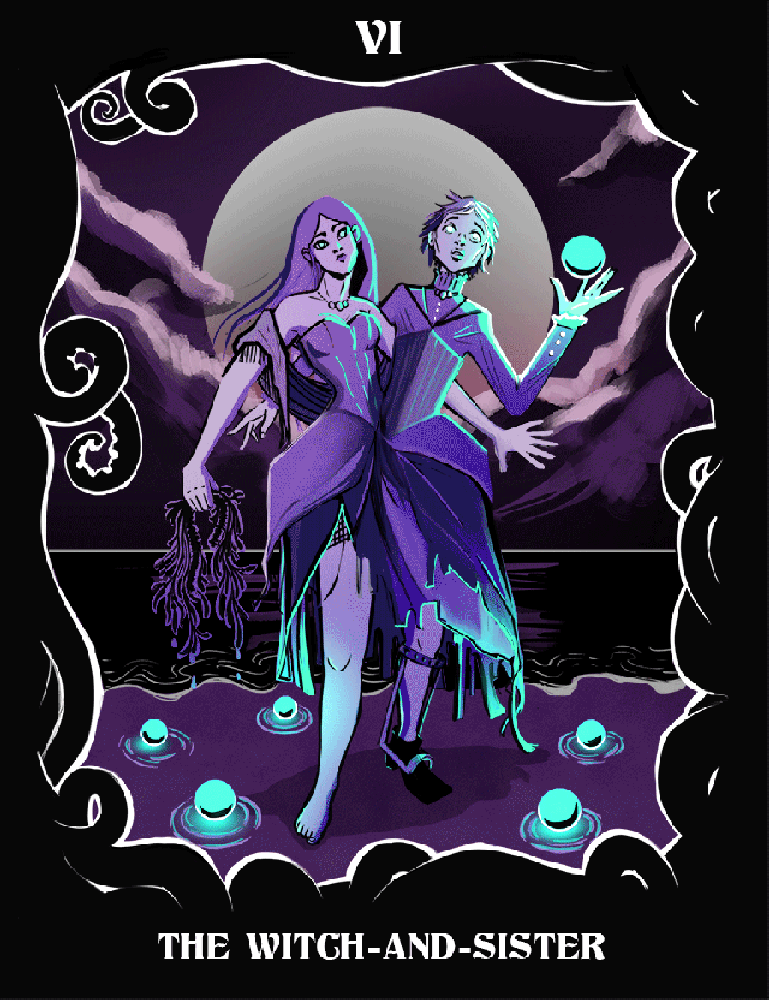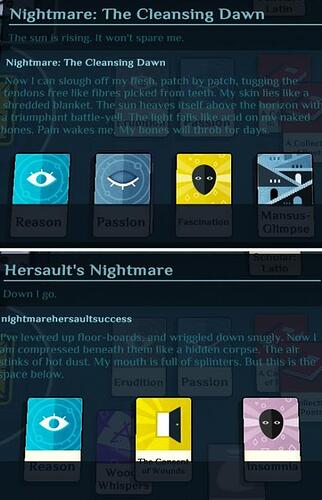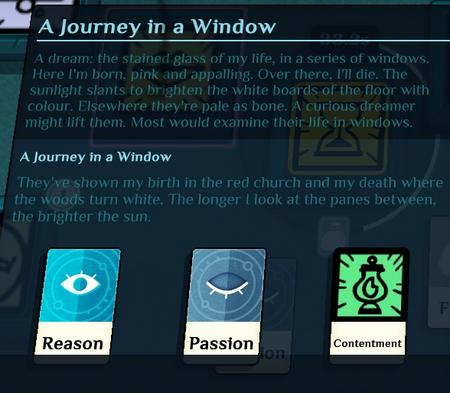[quote=Anne Auclair]Everything in the visible world has some sort of relationship with the powers of the invisible world. (“Thus the essence of these visions: what is below can’t escape what is above.”) Like to like is very much in effect.[/quote]Like to like?
[quote=Rook Crofton][quote=Anne Auclair]
Yes he is. My favorite part of the Cultist Simulator prototype is the books.
[snipped: Anne Auclair’s painstaking transcription of every book in the alpha]
[/quote]
Agreed! And thank you for this. The books (and dreams!) are so tantalising.[/quote]
You’re welcome ^_^
Hypothesis confirmed.
Galmier might be a reoccurring character. According to the map, Galmier’s Lodge is a location in the Wood.
.
[quote=Rook Crofton]Just thought I’d point out that you were tweeted about by Alexis himself:
https://twitter.com/alexiskennedy/status/893733241429032960
Nice going![/quote]
I saw. And I was pretty surprised! I guess that means I did a good job.
Here’s my analysis of Traveling at Night and Six Letters on Necessity. I had to think about these a bit more than the others.
Traveling at Night (Vol. 1)
The key word in its title is traveling. Illopoly’s work is a night by night travelogue of his dream journeys. And like any journey, there is movement from point A to point B - in this case, from the margins to the center. The first volume begins naturally enough with Illopoly on the outskirts of the invisible world, introducing the Wood. Later volumes will probably focus on Illopoly’s journey through the Wood towards the Mansus. Will he find a way to open its doors? That seems the real question. Consider how much time, effort and research it took Teresa Galmier to gain entrance.
Speaking of Galmier, her methods contrast markedly with Illopoly’s. Galmier began by intensely studying the mystical dreams of others and then theorizing about them, before taking the plunge herself (presumably the subject of her third book). Although Illopoly has done his share of preparatory reading ("as any student of the Histories knows"), he’s far less academic and much more learn from experience. The dreams he studies and utilizes are principally his own. This more narrative approach seems to have made Illopoly’s work more popular than Galmier’s – although Illopoly’s book is “bewildering,” he is "sometimes called the only readable occultist,” which leads me to suspect that he has a larger audience.
This makes me wonder about Illopoly and Galmier’s relationship. They appear to be contemporaries (their books are all recently published). Were they colleagues? Rivals? Did they have any encounters, in the visible world or in the Wood?
In the Alpha it is possible to get lore from both studying and dreaming. Perhaps Galmier and Illopoly are each meant to represent these two different methods of progressing in the invisible arts.
Julian Coseley’s Six Letters on Necessity
There isn’t really anything I can say about the book that isn’t already provided by its description. So instead I’m going to focus on how your character makes use of Coseley’s work. There is a major conflict between the clear intent of Coseley’s Six Letters and how the protagonist chooses to use them. Coseley is writing on the eve of personal catastrophe to warn one of his students away from the seductive and terrifying power of the secret arts. So, what is the quote that the game uses to sum up what your character learned from reading the Letters?
“Even the Sunne can be divided, though it require the Forge of Dayes for its division.”
And they get Ardent Prayers, lore which is about destructive/self-destructive transformation. Meaning your character has flipped or reversed Coseley’s warnings about the dire costs of occult power, turning them into instructions on how to acquire and pay for said power! Adding to the irony, Coseley’s student might have had the same idea when he compiled and published his masters’s Letters. 'Look how awesome my teacher was! He knew how to split the sun!’
‘Do not do this cool thing’ fails yet again. I suspect it won’t be the last time.
.
edited by Anne Auclair on 8/9/2017
I think the Witch-and-Sister (which one is the Witch and which one the Sister?) are an Hour of the Edge. Compare the above description to the description of the principle of Edge:
I’m also now 100% confident that the Geminial is about them. First, the astrological sign of Gemini is represented by two twins. Second, the Geminial is decorated with "twinned shapes of sad and luminous beauty," coral and all the phases of the moon. Third, its pages have incredibly sharp edges. Fourth, it is written in the language of Fucine, ‘the tongue of witches,’ who were in turn named after the nearby lake of Fucino. So twins, coral, moons, edges, witches, water…it’s their book. The only question is, why does the book also have the principle of Knock? Is it because the Witch-and-Sister unite rather than separate, so they aid those who try to overcome the barriers that separate them from knowledge?
.
edited by Anne Auclair on 8/12/2017
[quote=Rook Crofton][quote=Anne Auclair]
Just thought I’d point out that you were tweeted about by Alexis himself:
Nice going![/quote][/quote]
Hello all! Yes, I saw some traffic coming from here, and I enjoyed AA’s posts (which doesn’t mean they’re entirely correct, of course).
I’ve started adding fan contributions to the CS blog when I’m particularly impressed with them (eg http://weatherfactory.biz/cultist-simulator-a-field-report-part-1/ ). AA, if you’d like to see your exegeses up there, it’d be nice to have them! Drop me a line at noon@weatherfactory.biz .
oh and I should add: if anyone wants to get involved before the Cultist Simulator Kickstarter begins on September 1st, do lend your social media powers to the cause here:
https://www.thunderclap.it/projects/60124-cultist-simulator-kickstarter
thank you!
[quote=Alexis Kennedy]Hello all! Yes, I saw some traffic coming from here, and I enjoyed AA’s posts (which doesn’t mean they’re entirely correct, of course).
I’ve started adding fan contributions to the CS blog when I’m particularly impressed with them (eg http://weatherfactory.biz/cultist-simulator-a-field-report-part-1/ ). AA, if you’d like to see your exegeses up there, it’d be nice to have them! Drop me a line at noon@weatherfactory.biz .[/quote]
Awww, that is so flattering, thank you ^_^
And hooray, my theorizing is slightly correct, or even somewhat correct! ^_^
Man, I’m just hoping Cultist Simulator will somehow tie into Fallen London (in a way people who know will understand; and people who don’t won’t).
The Sun-in-Rags concludes endings beautifully. He is usually reckoned one of the Gods-from-Light; but Julian Cosely (the seventeenth-century magus and reputed immortal) has indicated he should in fact be numbered among the Gods-from-blood. He burns; he is distant; he is not as he was. He wears gold and red.
Some thoughts on this entry.
-
I’m vaguely reminded of the King In Yellow. I suspect this is intentional. Also, the eyeless, toothy frowny face in the clown motley is really creepy.
-
This seems some pretty clear foreshadowing that Julian Coseley is a not insignificant character. He either wrote more than The Six Letters on Necessity or some of his teachings were passed down by his students. Given he is a reputed immortal, maybe he or some of his students are still alive.
-
The Sun In Rags is Hour/Secret God number twelve. There are Seven Principles/Hours: Lantern, Moth, Heart, Grail, Forge, Edge, and Knock. As Alexis has described things, each principle seems to be an Hour unto itself, but it’s also clear there are many Hours besides the Big Seven. We have Hours like the Witch-and-Sister that seem to embody multiple principles (Edge & Knock) or, like the Sun In Rags, are difficult to place. And there are three additional classifications based on origins: Gods From Light, Gods From Nowhere, and Gods From Blood. A big part of the game is combining different pieces of lore to make rituals and stuff like that. In theory, there could be as many as between 42 to 49 possible basic lore combinations, depending on whether you can combine two pieces of the same lore ( 7 * 6 verses 7 * 7). So there is a lot of space for what one might call "border Hours" - gods and powers that embody more than one occult principle.
-
The Hours are being revealed via a special tarot deck. Tarot decks have 22 Great Trumps:
0 (or 22) The Fool
1 The Magician
2 The High Priestess
3 The Empress
4 The Emperor
5 The Hierophant
6 The Lovers
7 The Chariot
8 Strength
9 The Hermit
10 Wheel of Fortune
11 Justice
12 The Hanged Man
13 Death
14 Temperance
15 The Devil
16 The Tower
17 The Star
18 The Moon
19 The Sun
20 Judgement
21 The World
So we might be looking at around 22 secret gods. The Watchman has the same number as the Magician, whose role involves bridging worlds and divination. The Witch-and-Sister occupy the same position as the Lovers, who are associated with Gemini. And the Sun-in-Rags shares its number with the Hanged Man, which isn’t necessarily as bad as it sounds as the Hanged Man is associated with dedication, patience and sacrifice. The Sun-in-Rags is attired like a down on his luck monster clown, which I suppose signals dedication and sacrifice. So the tarot numbers aren’t being chosen at random; the Hours have some correspondence or likeness to the Great Trumps of the standard tarot deck. I wonder which Hours will share numbers with Death, the Devil, and the Tower.
.
edited by Anne Auclair on 8/11/2017
Anne, why don’t you make like spacemarine and start a lore blog?
Ooh, you could call it "i’m a cultist"!
[quote=Infinity Simulacrum]Anne, why don’t you make like spacemarine and start a lore blog?
Ooh, you could call it "i’m a cultist"![/quote]
Oh, it’s much too early for something so elaborate.
Anyway, here’s an attempt at some good old fashioned numerology.
In tarot decks there are 21 Great Trumps + the Fool. The Fool is usually an unnumbered card or a zero, so let’s set it aside for now. That leaves 21 Hours/Secret Gods. There are three categories of divine origin: Gods From Light, Gods From Blood, and Gods From Nowhere. There are seven occult Principles: Lantern, Moth, Heart, Forge, Edge, Knock, and Grail. 7*3 = 21.
So it seems likely to me that there are seven Gods From Light, seven Gods From Blood, and seven Gods From Nowhere. More speculatively, there might be three Hours per each of the seven Principles (three Hours of the Lantern, three Hours of the Moth, and so on). Even more speculatively, of every three Hours, one might be a core Hour that fully embodies its home Principle while the other two might have responsibilities or interests that involve them to lesser degrees with other Principles. Anyway, the point of this speculation is to give us some idea of the sheer size and complexity of the divine world in Cultist Simulator. And this is before we’ve even entered into all the alternative-aspects, emanations, servants, alliances, and antipathies that gods are so well known for.
.
edited by Anne Auclair on 8/11/2017
Alexis recently conducted an interview with PC Gamer. Here are the sections where he talks about Cultist Simulator:
So, Cultist Simulator. It’s the next big thing.
Yeah, well it’s the next medium-sized thing.
Tell us everything we need to know.
Commercially and critically, I want to do two things that intersect. Commercially: I’m interested at the moment in making small, good, well-defined games. There’s always this rising tide of quality and scope with indies now—I’ve just played Pyre last week and, oh my god, you’ve seen the level of polish on that. I don’t want in the near future to run a team that is expected to produce anything of that quality. Sunless Skies, which is a bigger proposition from what Sunless Sea was, from what I’ve seen is coming along extremely polished. If I want to do things that other people haven’t done with a smaller team of freelancers, and I can give people a good product that they enjoy, and then move the hell on and do something more difficult—that’s really what I’m after, this modest scope.
Having a modest scope means I only have to have a modest success in order to keep making games. From a creative perspective, I want to keep on making stuff that serves two purposes: One, it’s an overlap between game design and story—so there’s a lot of resources management alongside story. And two, it freaks people the **** out. My creative calling is very much to freak people the **** out. One of the things that was constant with Fallen London and Sunless Sea was that there’s this back and forth between: It’s terrible, but it’s kinda funny; it’s really horrible, but it’s kind of daft. That’s what I always say about cannibalism. Of course eating people is wrong, but funny, but wrong. It’s a serious issue—it’s the basis in English case law for the defence of necessity not being available for murder, but it’s also monstrous.
With Cultist Simulator what I wanted was to get back to that space so that you are living in Cultist Simulator as someone who is digging into the things that they need because they can’t be satisfied in the real world. That’s what I was getting at with apocalypse and yearning—you want to do something abominable. If you give a player a toolset and say: Right, you’re a cultist, you go away and contact alien gods, seduce disciples into your service, feed your abominable appetites and, ultimately, rain blood down on the world. A lot of people will go: **** yeah, on principle.
A lot of people will do those things, but think about why it is you want to do them—not to get moralised by it but think about whether it’s about power or revenge or curiosity or just because you don’t give a ****. And then, have a lot of narrative elements around it that ground that player’s quest, to give them the opportunity to turn sides, or to double down, or to switch motives. One of the things you can do in the game at that moment is that you can choose either enlightenment, or power as your motive in seeking occult knowledge. If you change your mind you can switch and that changes your victory conditions.
…
Cultist Simulator strikes me as something Failbetter could have lent its name to. You could have, for example, taken a sabbatical and returned with this. Why was going it alone and starting again important to you?
There’s two things that I couldn’t do with Failbetter that I’m doing with this. First of all: Failbetter makes a particular kind of game these days and it’s very hard to step away from that world and that game. I don’t know, I’m not sure the guys know, that the next game will be in the Fallen London universe or not. I’d been writing Fallen London for seven years and I felt pretty much done with it. There’s that and there’s a whole infrastructure of expectation and technology about the way stories work, the quality, the choices, the very specific things that [their] playerbase expect. It’s very interesting having worked at BioWare, it’s a similar sort of thing—they want to do something new with each game but at the same time they have this huge burden of expectation from their playerbase who get quite frantic if they’re not getting the game they expect. I knew there was going to be that kind of expectation with more games from Failbetter.
And the other thing is, I wanted to get my hands dirty making games myself. I was doing less and less writing, I hadn’t done any coding in years and I do enjoy that. I was managing people who were managing people. I’m very happy to go back to running a team again, I missed that. But I think once you get to the point where you’ve got two layers of management underneath you without realising you’ve allowed that to happen then you head back. We could’ve hired a professional CEO and I could’ve taken a step back from the business and became the creative director, but that’s obviously a tricky route to take.
My reaction when I’m faced with a difficult situation has often been to do something slightly nuts, like selling a company and going off on my own. That was very much how Failbetter was founded in the first place when I left a company as a software consultant to start this ridiculous which, at the time, wasn’t even a games studio—it was this sort of transmedia thing that did some sort of web thing. But yeah, I’m really enjoying the independence, Failbetter is a great studio and I’m still very much in touch with the folks there.
…
Back to Cultist Simulator. There’s a Kickstarter in the works?
Yes, there is. If anyone interested visits my Twitter or the Cultist Simulator website, there are links to the various things, and I’ve got some social media stuff running ahead of the Kickstarter. We’ve got the Kickstarter in September for a launch in February. There’s a couple of things about the Kickstarter and launch which are slightly unusual.
First of all, I am deliberately running a modest Kickstarter—I think I’ll probably be looking for around £30,000, which is half of what Sunless Sea looked for three years ago. I want to pay my artists and my UI freelancer. I can support myself for a while but I want to get as much third party resources as I can. That’s the goal for funding: To make the game as good as it can be. Consequently, I’m managing my and everyone’s expectations and a lot of the rewards—I’m not offering all the rewards you might expect from a regular Kickstarter, I’m focusing on making it simple for people to understand and simple for me to provide.
Some of the rewards are dafter than others. To my girlfriend’s consternation, the £5,000 reward is allowing a backer to choose which piece of game art I’m going to have tattooed on me. Although my other half gets a veto. That’s the high end one. But I’m really looking for something that’s clearer and modest in scope rather than something bigger. It’s always tempting when you’re doing a Kickstarter to bang the drum as hard as you can and try to run that funding total up. The thing is, everything you offer in a Kickstarter you’re writing a cheque for. I don’t want to promise anything I’m not confident that I can achieve.
Also, there will only ever be one version of Cultist Simulator until full launch. There will be no backers’ alpha, backers’ beta, or separate early access version—if you back it on Kickstarter or subsequently buy it on Steam Early Access or GOG Games in Development on on Itch Refinery or any of that stuff, then what you get is access to the current build and a guarantee that you’ll get all the additional content and DLC forever. It gets so complicated from the dev side keeping track of who’s bought into the alpha, who’s bought into the beta, dealing with people asking whether getting the early access version is the same as getting access to the Kickstarter version, that I just wanted to say: Here’s the simplest thing possible, I want to provide extra value to the people who back the game early.
.
edited by Anne Auclair on 8/12/2017
Has anyone else played the prototype?
I submit a report from the current incarnation of Cultist Simulator, which I’ve mentally redubbed as Alexis Kennedy’s Desk of Doom. Fair warning, the UI looks like this:
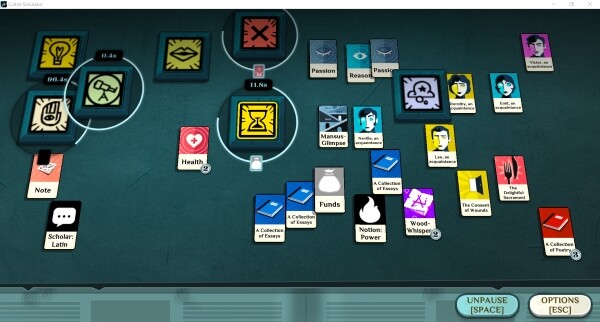
Three Rounds with the Desk of Doom:
Character-wise, the PC is a bit less of a misanthrope than their earliest incarnation, when everything was graphics-free. But my own disposition sours a tad when I find you have to completely unload all cards from the slots in the Timers to get their mechanics to reset. I twig, but die of starvation too fast to benefit.
I start again and get an illness, which goes untreated and grants me the boon of death, only quicker. I die gnawing on an old paintbrush, having stupidly attempted to sustain myself by selling art. Restarting again, it’s time to get a job and only one place is hiring: Glover and Glover.
Meanwhile, on the Desk of Doom interface, everything careers everywhere and I forget where I’ve put stuff. It’s almost like having an actual desk.
I encounter ephemeral meat tools…I mean people…with 1920’s names. I talk to Victor. I talk to Enid. I talk to Neville, who looks like the Fifth Beatle. To be more precise, I talk at them. Judging by the parted lips and glittering eyes, I suspect they reckon all this natter about Glimpses and Passion has carnal relevance. I am starting a cult, not a dating agency. And if my eyes are glittering for anything, it’s a sandwich.
Having risen as high as I can at Glover and Glover without becoming a mere drone, I fantasise about murdering the younger Glover and getting promoted. I don’t need to magic him to death or anything, I’ll just lock him in a broom cupboard for ten minutes, and wait. It seems to work on me.
The Authorities become suspicious of me, which is reasonable. I buy books from Morland’s – De Horis, Six Letters on Necessity, The Orchid Transfigurations. And a Latin grammar, handier than it first appears. And a shedload of Essays and Poetry. The coral-encrusted grimoire written in Fucine never appears for me, alas.
I generate a piece of Lore by reading De Horis: a Wood-Whisper. And a piece of Erudition. Go, Team Oblivion, go!
On the Desk of Doom, stuff gets stacked on other stuff, tomes go awol. A Book of Essays costs three Eruditions to craft from, and I scrabble for more Erudition as timers tick down inexorably. It reminds me of that time I decided the Pomodoro technique was a fine idea.
With a Book of Essays and three Eruditions, I craft a card: a single, new-minted Reason.
But the Authorities are breathing down my neck and I try to sic the blame on Victor. If he were a Follower of mine, I could, but I can’t manage to make anyone a Follower, either by talking or dreaming or studying. I am stuck as a no-mates unicultist, forced to pay off my accusers and reschedule my plans for the End Times.
I finally come up with a Study combination for Lore that offers to do something: The Delightful Sacrament (absolutely not about eating anyone) and A Collection of Poetry. Entertainingly, it starts ticking away on its own. Will I reconstruct the Cannibal Hymn of Unas from first principles…or the chorus of Eating People is Wrong? Well, it does nothing at all, and neither does any other combo of Lore/Lore, Lore/Books or Lore/Anything I can devise. Also, it’s possible to load Lore cards into the Dream timer, though I suspect it shouldn’t be.
That canny old bird Morland only sells me Essays and Poetry now; she knows a mark when she sees one. It’s frustrating. Eventually, the Authorities catch me out, by deviously starting their Investigating timer below my eyeline so that I never have time to buy them off. I’m slung into the hoosegow, where I doubtless turn into Noon-world’s version of Renfield.
I have subsequently had a slightly more successful game where I actually did manage to craft a Rite from Lore and make stuff in my Dreams, but this is long enough already. I’ll put up what I found if anyone’s interested.
edited by Vexpont on 8/12/2017
[quote=Vexpont]I have subsequently had a slightly more successful game where I actually did manage to craft a Rite from Lore and make stuff in my Dreams, but this is long enough already. I’ll put up what I found if anyone’s interested.
edited by Vexpont on 8/12/2017[/quote]
Sure ^_^
I thought the Cannibal Hymn of Unas was a literary reference or something you made up, only to discover that it was an actual hymn in an actual Ancient Egyptian pyramid, which is kind of hilarious. I mean, The Cannibal Hymns of Unas could easily be the title of a Lovecraft story.
It is a genuine ancient incantation about gaining the powers of the gods by cooking and eating them. It contains very few serving suggestions, apart from soup.
Long, long post. Unlike yourself I have screengrabbed some of the text because I, alas, am lazy.
Desk of Doom 2: Death to Neville
To start with I used Dreaming to cure myself of Afflictions by loading up Affliction alongside a bag of Funds. As others have no doubt discovered, it turns out that you can do things in your Dreams by starting with a Reason card, and when it’s run through its initial timer, putting another card into the slot revealed (unlike dreaming of Passion, which just gives you Contentment). Dreams that are not the standard Tree of Lights:
Using Reason + Reason
Hersault’s Nightmare [Edge]
Success gives: Insomnia [Edge] + Consent of Wounds Lore [Knock] + Reason
Failure gives: Insomnia [Edge] + Reason
alternate result:
The Cleansing Dawn [Lantern]
Success gives: Fascination [Lantern] + Mansus-Glimpse Lore [Lantern] + Reason
Failure gives: Fascination [Lantern] + Reason (probable, but haven’t done it yet)
A Journey in a Window (this uses a Fleeting Memory somehow, but I’m damned if I can make it happen again. No Failure, I think)
Screengrab of the result for Hersault, the Dawn, and Journey in a Window:
So, I don’t much like babies, and I want revenge on the Universe for making my existence possible. Maybe. Other dreams:
Composure (Insomnia/Fascination card regeneration with no Failure. I have not found any uses for Insomnia/Fascination)
Insomnia/Fascination + Contentment > Reason (this regenerates your original Reason card)
Insomnia/Fascination + Fleeting Memory > Reason (this regenerates your Reason too)
Having found a use for them, I put useful evanescent cards like Contentment on ice in random timers I’m not using currently. The utility of this dodge is debatable.
I’m a slow student, but I finally manage to create a Rite of the Crucible Soul from Studying two pieces of Lore – Ardent Prayers and what I think must have been my Delightful Sacrament, since it’s not there any more. I think I should be able to see a storylet called ‘The Key to My Heart’ if only I can slot said Rite into its correct timer, but none of the timers obey me. (I suspect this is due to my failure to recruit Followers, so that the proper timer hasn’t been generated yet).
The nameless and probably pointlessly unpleasant ceremony I can see by slotting Rite of the Crucible Soul into Studying will require a sacrifice.
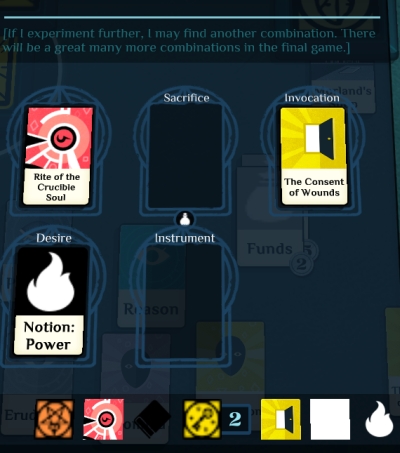
Now, this is more like it. I shall cast shy, awkward Neville in the role he was born for. To watch his realisation as the inner flame takes hold…
I can’t do it.
But not for want of trying. I can’t do it. I still cannot recruit Followers. Talking to Acquaintances with an eye on the timer doesn’t reveal another slot to bung Mystique or Notoriety at them before they generate more, and neither does my backup plan of approaching Neville on an unexpected Pleasant Day.
If it turns out that this is a blindingly simple task that I’ve overlooked it in favour of futile tinkering…well, it wouldn’t be the first time.
Other Things I Cannot Do: I have yet to devise a repeatable source of Glimmering or Erudition. You can craft more Reason and Passion cards by reading Essays or Poetry, respectively. In order to read Essays or Poetry you need Glimmering or Erudition. But I could only manage to get Glimmering or Erudition by reading esoterica bought from Morland’s, and after a bit she would only sell me…Essays or Poetry. Damn the woman.
Being investigated by the Authorities works weirdly. Like the ‘Time Passes’ timer, which auto-draws Funds cards to sustain you, the Investigated timer is ‘greedy’; it auto-draws Notorious cards, and if there isn’t a Notorious card on the desktop, it generates one. Getting rid of Authorities gives you two Notorious cards, but they stay in the dead Timer of the now-defused Investigation; you’re not forced to put them on the desktop. Eventually the right corner of my desk looks like this:
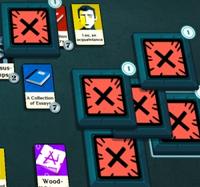
At this point, I fumble a card straight onto a timer, and as A Dimness warned, the game crashes leaving me unable to pick up or move cards, while the timers carry right on ticking. Paralysed, I catch an Affliction and die.
Knowing I risk Starvation, I cut things close Funds-wise to get to the interesting part again, catch a simultaneous Affliction, and die like this, which I consider unsporting of the RNG:
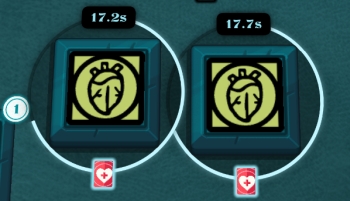
Basta! And Neville lives on, his innocence wasted on the quotidian, rather than flaming out as it should. Curses.
Verdict: definitely not the FL Universe (‘Hours’ are basically gods here, whereas in Sunless Skies, they’ll be chunks of transferable lifetime, I think). I am more than ready for IF crossed with proper cardplay, and maybe this will have the latter, but I’m not holding my breath. It’s odd what a difference first-person voice makes to a game, and the personality of the protagonist is very different, more like one of Arthur Machen’s dangerously inquisitive artist types than the randy, swashbuckling academic of FL.
Oh, to recruit followers you need to use "Mystique" in the "Work" tab, after your society is funded, you get a new tab with about 10 seconds to use a Lore item (ie "consent of wounds") to decide what kind of society you wish to fund. Once you have a society you can use it as first card when using the Talk function, along with notoriety/mystique and an Acquaintance, using all three will result in your Acquaintance becoming a Believer and thus a usable follower.
So far I’ve only managed to fund a Society of Midnight with the Consent of Wounds, and according to flavour all societies so far are identical in function, still curious as to what all the different society names are though.
edited by A Dimness on 8/13/2017
Oh, and I’ve found out that if you do menial work (using Health in the "Work" tab), you can get An Injury, which is apparently something the Mother of Ants looks upon with favour. There might be some interaction between Consent of Wounds and an Injury to be found.
edited by A Dimness on 8/13/2017
There seem to be six acquaintances in total which are matched in male/female pairs. Leo and Dorothy, the yellow acquaintances are both described as gullible and earnest, Enid and her partner which I’ve not so far met seem to be both mystic and dreamy, and Victor and his partner whom’s name I’ve forgotten are sly. Mechanically, all companions seem to function the same, though I suppose in the future you’ll only be able to recruit sly companions with Notoriety and dreamy companions with Mystique, while gullible companions with both?
edited by A Dimness on 8/13/2017
[quote=Vexpont][quote=Anne Auclair]I thought the Cannibal Hymn of Unas was a literary reference or something you made up, only to discover that it was an actual hymn in an actual Ancient Egyptian pyramid, which is kind of hilarious. I mean, The Cannibal Hymns of Unas could easily be the title of a Lovecraft story.[/quote]It is a genuine ancient incantation about gaining the powers of the gods by cooking and eating them. It contains very few serving suggestions, apart from soup.[/quote]Wow.
Egyptians though? Pretty sure the inhabitants of the Third City must’ve had something like this as well ;)
But, soup or… zzoup? :P
Oh yeah, and…
[quote=Alexis Kennedy]If you give a player a toolset and say: Right, you’re a cultist, you go away and contact alien gods, seduce disciples into your service, feed your abominable appetites and, ultimately, rain blood down on the world. A lot of people will go: F*** yeah, on principle.[/quote]That’s just awesome, you know. ![]()
edited by phryne on 8/13/2017
[quote=Vexpont]The Cleansing Dawn [Lantern]
Success gives: Fascination [Lantern] + Mansus-Glimpse Lore [Lantern] + Reason
Failure gives: Fascination [Lantern] + Reason (probable, but haven’t done it yet)[/quote]
The Cleansing Dawn is currently bugged and gives you the same reward whether you fail or succeed in the dream. When you fail the Sun’s light just makes your bones ache. When you succeed, the Sun’s light actually inscribes writing on your dream skeleton (and maybe a little on your actual skeleton, seeing as how your bones ache for days afterwards…).
[quote=A Dimness]Oh, and I’ve found out that if you do menial work (using Health in the "Work" tab), you can get An Injury, which is apparently something the Mother of Ants looks upon with favour. There might be some interaction between Consent of Wounds and an Injury to be found.
edited by A Dimness on 8/13/2017[/quote]
Ooooh, that’s very interesting. I missed that.
.
[quote=A Dimness]There seem to be six acquaintances in total which are matched in male/female pairs. Leo and Dorothy, the yellow acquaintances are both described as gullible and earnest, Enid and her partner which I’ve not so far met seem to be both mystic and dreamy, and Victor and his partner whom’s name I’ve forgotten are sly. Mechanically, all companions seem to function the same, though I suppose in the future you’ll only be able to recruit sly companions with Notoriety and dreamy companions with Mystique, while gullible companions with both?
edited by A Dimness on 8/13/2017[/quote]
Enid and Neville, Victor and Rose. It’s only Leo who really seems gullible to me. Dorothy has an eclectic reading habit, so she strikes me as rather clever (but then, I have an eclectic reading habit too - so I would think that, wouldn’t I?). There is currently only one real difference between the six believers: Victor and Rose are very good at stealing stuff. You can use Enid and Neville or Leo and Dorothy for burglary, but these attempts will most likely end in failure after failure. If you have a job that requires a sly opportunist, then give it to Victor and Rose, they’ll get it done. This indicates that believers will have different specializations based upon their defining occult principle. It follows that some might be better suited for certain cults and rituals than others.
edited by Anne Auclair on 8/13/2017
Teresa Galmier’s story continues. As I suspected, there is a third, vaguely supernatural book about her entrance into the Mansus - Trespasses. But it wasn’t her last work. She also wrote a fourth volume…and I’m honestly a little apprehensive about that one. If Trespasses is uncomfortable and outright dangerous to read, what should we expect from her final book?
[quote=Alexis Kennedy August 9, 2017]THE LOCKSMITH’S DREAM (1925 edition)
Last week I shared an image of the 1923 two-volume edition of the Locksmith’s Dream – ‘The Light through the Keyhole’ and ‘Portions and Proportions’.
I was aware that the first three volumes were republished as separate editions, but I hadn’t expected ever to see them. I was excited – but also rather alarmed – to receive a package from ‘A Well-Wisher’ containing volumes 2 and 3. It doesn’t mean I’ve been stalked -my studio’s mailing address is easily available online – but I don’t really want the Long to take an interest.
I may as well be hung for a sheep as for a lamb. Here are the volumes I received.
I can see why ‘Trespasses’ has the reputation it does. It’s not an easy read, and Galmier’s sense of humour has begun to fray. She’d been through a lot, I guess. Obviously there are dangers in reading about dreams of this nature, but I’m taking the necessary precautions.
There was a postcard in the package, from a certain seaside resort on the south coast of England: but ‘Well-Wisher’ has asked me not to reproduce it or to name the town. I can say that it appears to have been sent by Galmier, in 1927, after the final volume – the fourth – was released. I can’t authenticate it. I’d like to believe it’s really her. She writes very winningly about the wind.[/quote]
edited by Anne Auclair on 8/15/2017
A new article has just been published over at PC Gamer: Do games have enough respect for your spare time? In it they talk to Alexis and he uses the opportunity to talk some more about what he hopes to do with Cultist Simulator. Here are the relevant passages:
[quote=Samuel Roberts, PC Gamer]Roguelikes, or games with roguelike elements, are repetitive by design. I love FTL, even though I’ve tackled the same intergalactic moral conundrums a bunch of times and memorised all the various ways they play out. With such light touch writing, though, I can blitz through them and focus on accumulating a large crew and decent ship upgrades for the game’s final battle.
Presenting the same chunks of story over and over again can still be a test of the player’s patience. In the roguelike narrative game Sunless Sea, permadeath meant repeating chunks of text-heavy scenarios. Alexis Kennedy, the game’s creative director, is frank about that. "I think having long negative spaces between events in Sunless Sea made the game, but one thing I regret most, by a long way, is making players repeat content after permadeath. That was just me trying to make two different kinds of games at the same time. It’s not a mistake that I hope I’ll make again." It’s something that Failbetter’s promising-looking space-based follow-up, Sunless Skies, is looking to avoid. It’s even mentioned in the game’s Kickstarter pitch video.
"FTL was one of my influences on Sunless Sea, but we didn’t do a lot of the things FTL did well. You might play five games, or you might settle down and have a dramatic game that lasts all evening. Cultist Simulator is something much more lightweight: something that you could play over evenings and evenings and get hundreds of hours of play out of it, but you can finish the game in the evening."
Cultist Simulator is a narrative board game, the prototype of which you can download now. To avoid repetition, Kennedy is looking at including a legacy system similar to Sunless Sea, only with a few additions—that is, you play as a successive character each time, so there’s a sense of continuity between playthroughs, but more random elements shape your protagonist so the game feels different from the start.
…
I’m convinced that some of the success of PlayerUnknown’s Battlegrounds is down to the way it respects your time as a player. Games last around 20 or 30 minutes and the matchmaking is quick, making it the most concentrated and gratifying form of battle royale around. "I was actually thinking about that as well when I was making Cultist Simulator," Kennedy says. "The games are almost in no sense alike and they’re at the opposite ends of the market, but you know what you’re getting into. It’s not just that it’s something that takes up a short period of time—a lot of games are short and not interesting—it’s that at least I know how much time I’m going to have to invest in it." [/quote]
edited by Anne Auclair on 8/17/2017
The Mirror of Glory
An occult society dedicated to the understanding of the Light that leaks from a fiercer place.
The Society of Midnight
An occult society dedicated to the Hour at night’s heart, on which the world turns.
The Unflinching Order
An occult society dedicated to the fire that changes and remakes.
The Wildwood Club
An occult society dedicated to chaos, and the unexpected Hours.
The Order of the Bloody Cup
An occult society dedicated to the mysteries of birth, blood and appetite.
The occult societies dedicated to exploring the mysteries of Edge and the Heart Relentless have yet to be introduced.
[quote=Anne Auclair]In tarot decks there are 21 Great Trumps + the Fool. The Fool is usually an unnumbered card or a zero, so let’s set it aside for now. That leaves 21 Hours/Secret Gods. There are three categories of divine origin: Gods From Light, Gods From Blood, and Gods From Nowhere. There are seven occult Principles: Lantern, Moth, Heart, Forge, Edge, Knock, and Grail. 7*3 = 21.
[/quote]
I’ve been wondering how 21 Great Trumps would work when a normal earth day has 24 hours. Are there three extra, wildcard Hours who don’t really have a single principle? Do some principles have more Hours than others? Or is there an extra layer of intricacy that just hasn’t been revealed yet?
.
edited by Anne Auclair on 8/21/2017
